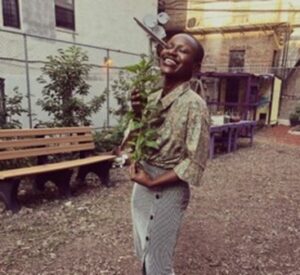Lesson 44 –
Psalm 107:1-7, 33-37
O give thanks to the Lord, for he is good; for his steadfast love endures forever.
2Let the redeemed of the Lord say so, those he redeemed from trouble
3and gathered in from the lands, from the east and from the west, from the north and from the south.
4Some wandered in desert wastes, finding no way to an inhabited town;
5hungry and thirsty, their soul fainted within them.
6Then they cried to the Lord in their trouble, and he delivered them from their distress;
7he led them by a straight way, until they reached an inhabited town.
33He turns rivers into a desert, springs of water into thirsty ground,
34a fruitful land into a salty waste, because of the wickedness of its inhabitants.
35He turns a desert into pools of water, a parched land into springs of water.
36And there he lets the hungry live, and they establish a town to live in;
37they sow fields, and plant vineyards, and get a fruitful yield.
Background
We will only be reading a select excerpt from this passage, but in your own devotional period, take some time to read the entire 107th Psalm. As you read, what do you notice about what is in this week’s passage and the full Psalm? Why do you think the organizers of the Lectionary Calendar chose to do that?
Today’s lesson will focus on seeing God in nature. Read the scripture out loud together.
Discuss with someone in your home. Where is your favorite landmark in New York City? In Brooklyn? Why?
What’s happening during this passage?
As with many psalms, the passage begins with thanks and praise to God, an exhortation to the congregation, and it continues with a story of what happened to “some.” While these “some” were “wandering in desert wastes” and their “soul fainted within them,” they called to the Lord and were “delivered” from “their dis- tress.” The 33rd verse describes a God who can undo lush, verdant, green lands and turn it into “a salty waste.” But this is also a God who can take the desert and turn it into “pools of water.” In this place, “the hungry live” and “establish a town to live in.” The text describes what sounds like the beginning of an established, organized community.
What is thankfulness?
We say grace before we eat. We say “thank you” when someone holds the door for us. We send “thank you” notes after baby showers and weddings. The act of “thanks” is one that acknowledges that things could have gone one way, and they didn’t. But sometimes “good things happen to bad people” and “bad things hap- pen to good people,” and life just doesn’t make sense. This psalm acknowledges some possible scenarios that are unfavorable. Gratitude and thankfulness, then, is a practice of acknowledging that things have gone a favorable way.
What are some prominent images in this passage?
There are consistent images of water, desert, towns, and vineyards. The striking thing about the Psalms is that while they detail complex theological ideas, they of- ten rely on images from nature to explain the point. And in this vignette, the psalmist describes God as the one who makes deserts turn into pools of water. The writer sees God as an actor in and director of nature.
If you were to look to examples or proof of God in Brooklyn, you might name churches, or historic cultural landmarks, parks. Where else might you see God’s work?
What images bring you a sense of gratitude? Take some time to sketch it on a separate piece of paper.
What questions do you still have of this scripture? How will you commit to journeying with this text this week?
 Connection to Today’s World
Connection to Today’s World
Would you believe that there’s a farm in the Bronx? The Black Joy Farm is a nearly seven-year-old community space that has been growing food in the South Bronx. Their project started to make sure that all people have a place to get quality foods. In response to the food apartheid happening in neighbor- hoods like the South Bronx, they started a buying club to “offer an alternative that enriches the overall health of folks both emotionally and physically.” This project started with a license from NYC’s Department of Housing, Preservation and Development in 2013, and in 2014 they
started the journey to grow hundreds of pounds of food. They have also hosted workshops, family movie nights, community workdays, team building exercises and parties that center “radical joy of Black people of marginalized genders.”
You can learn more about them at https://www.theblackfeministproject.org/blackjoyfarm
Journal: What do you see outside your window? Where is God on your own block?
Closing: Sing/watch “As,” by Stevie Wonder.
As around the sun the earth knows she’s revolving
And the rosebuds know to bloom in early May
Just as hate knows love’s the cure
You can rest your mind assure
That I’ll be loving you always
As now can’t reveal the mystery of tomorrow
But in passing will grow older every day
Just as all is born is new
Do know what I say is true
That I’ll be loving you always
Until the rainbow burns the stars out in the sky (Always)
Until the ocean covers every mountain high (Always)
Until the dolphin flies and parrots live at sea (Always)
Until we dream of life and life becomes a dream
Prayer:
Dear God,
You are a God of “summer, winter, springtime and harvest.” We join with “sun, moon and stars in their courses above” as we witness your majesty and creation. We are so distracted and stressed by multiple levels of dehumanization. We are tossed around, much like the people in the passage who wandered in desert wastes. We seek direction, leadership, compassion.
As we enter this week of increasing tensions and predicted virus spikes, we ask that you make a river out of this desert. We ask that you deliver us from our dis- tress. We know you’ve done it before, and we know you can do it again.
In Jesus’ name we pray, Amen
Works Cited: https://www.theblackfeministproject.org/blackjoyfarm





